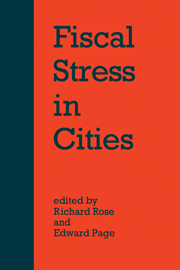Book contents
- Frontmatter
- Contents
- Acknowledgments
- 1 Can Government Control Itself?
- 2 Pressures in Whitehall
- 3 Pressures from Whitehall
- 4 The Decline of Urban Economies
- 5 Local Government as an Employer
- 6 Do Fewer Pupils Mean Falling Expenditure?
- 7 Local Autonomy and Intergovernmental Finance in Britain and the United States
- 8 Chronic Instability in Fiscal Systems
7 - Local Autonomy and Intergovernmental Finance in Britain and the United States
Published online by Cambridge University Press: 07 October 2011
- Frontmatter
- Contents
- Acknowledgments
- 1 Can Government Control Itself?
- 2 Pressures in Whitehall
- 3 Pressures from Whitehall
- 4 The Decline of Urban Economies
- 5 Local Government as an Employer
- 6 Do Fewer Pupils Mean Falling Expenditure?
- 7 Local Autonomy and Intergovernmental Finance in Britain and the United States
- 8 Chronic Instability in Fiscal Systems
Summary
The threat to local autonomy has been the subject of vigorous political debate in both the United Kingdom and the United States. Given the differences between the two countries, the terms in which the debate has been conducted have been surprisingly similar. In both countries the threat to local autonomy is seen to emanate primarily from intergovernmental fiscal relations, which are perceived as constraining local fiscal behaviour and rendering local government increasingly dependent on and controlled by national government.(1) This similarity in the terms of discussion and in the nature of the debate is striking in view of the substantial differences in the intergovernmental finance systems of the two countries and the widely held assumption that local autonomy – and local democracy in general – is much stronger and more vigorously valued and protected in the United States than in the United Kingdom.(2)
Unfortunately the political debate about the value of local autonomy and the extent to which it is threatened by changes over time in intergovernmental fiscal relations has suffered from substantial intellectual confusion in both countries. Frequently terms are not well defined, the logic of relationships is not specified, and empirical evidence about relationships is not brought to bear on the arguments. However, the similarity in the terms in which the debate is conducted in the two countries suggests that an analysis of local autonomy in a comparative context can serve to clarify our understanding of both.
- Type
- Chapter
- Information
- Fiscal Stress in Cities , pp. 168 - 197Publisher: Cambridge University PressPrint publication year: 1983
- 2
- Cited by



